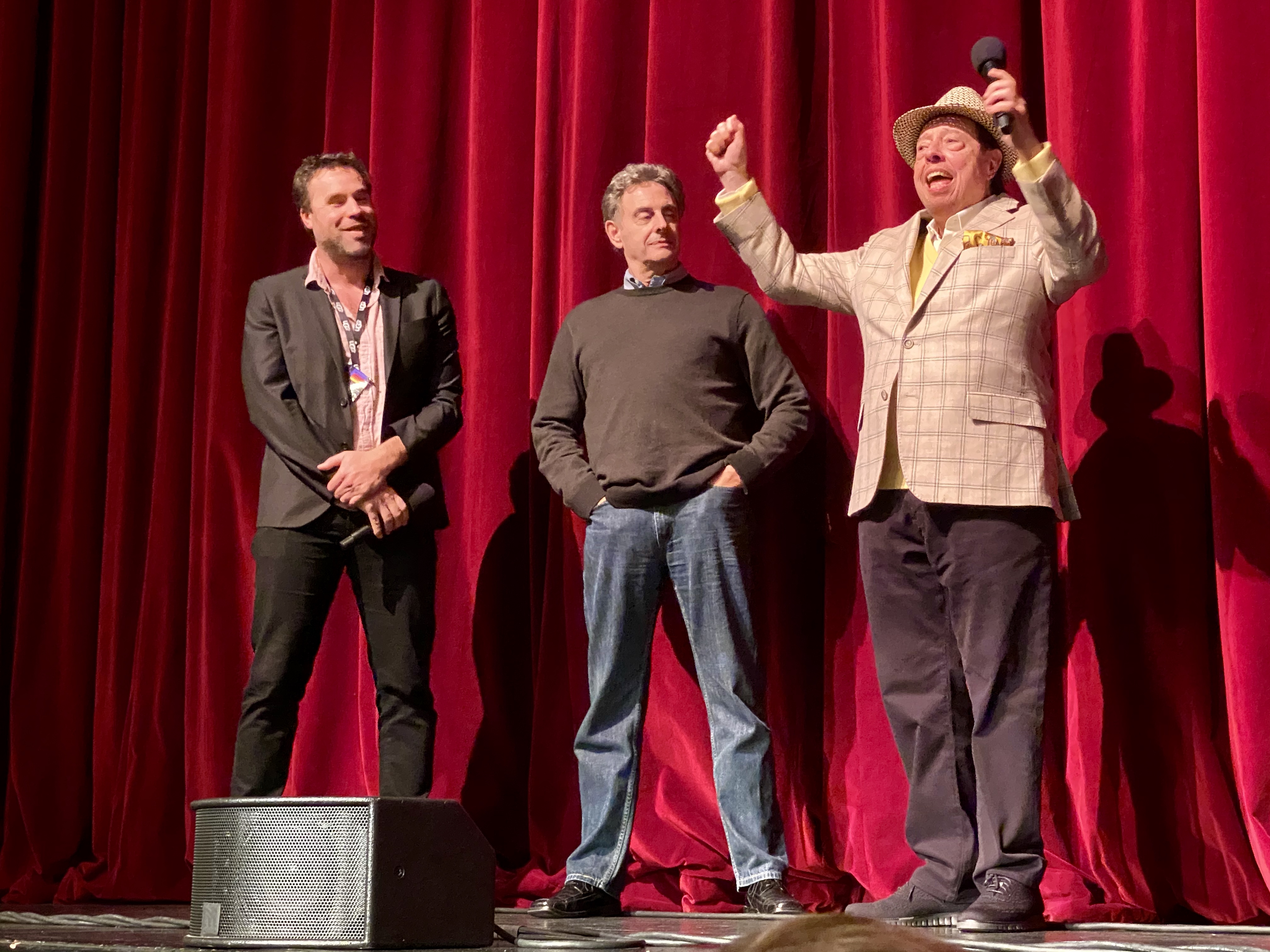Santa Barbara International Film Festival: Day Four
Sergio Mendes Plays Live, Plus Iranian and Peruvian Films

Music documentarian John Scheinfeld has taken on such iconic subjects as John Lennon, Harry Nilsson, and jazz deity John Coltrane — that doc premiered at SBIFF a few years back — and says his aim is to create three-dimensional portraits with his films. And, as he pointed out on the Lobero stage last night following the world premiere of his new Sérgio Mendes in the Key of Joy!, Scheinfeld’s current subject is very much alive, as compared to his earlier posthumous portraits.
At one point, Scheinfeld informed SBIFF moderator and programmer Michael Albright and a large Lobero crowd that “Sergio told me, ‘You better finish this thing quickly, before something happens to me.’” Mendez, with his signature beaming smile, was standing next to the filmmaker, nodding in affirmation: “Oh, yes, I did that.”
What made the premiere an extra special Saturday night outing was the 78-year-old Brazilian legend performing live on stage. Following the film and a Q&A, the Lobero screen raised to reveal a six-piece band — featuring his wife Gracinha Leporace as vocalist — and Mendes kicked our senses into three-dimensional, real-time musical splendor, playing three of his most classic pieces — his stylized version of the Beatles’ “Fool on the Hill,” Jobim’s great song “Waters of March,” and his seminal hit “Mas, que Nada!”
It was a thrilling moment, reminiscent of the night at last year’s SBIFF when Jakob Dylan and band performed on this stage, following is screening of Echoes in the Canyon.
Scheinfeld’s doc is a polished, music-filled, and thorough (possibly a bit too thorough, aka longish) telling of Mendes’ story, from his roots in early ’60s bossa nova scene to his move to Los Angeles and the creation of the hit-making band Brasil ’66. Signed to Herb Alpert’s A&M label, the band zoomed into the top of the pop charts and put forth a genuine, but easy-does-it Brazilian musical sound into the air of the masses.
Mendes’ original singer Lani Hall departed soon after the hits came, after romantically connecting with Alpert. (Incidentally, Alpert and Hall play the Granada on February 28, and is the subject of another, newly completed Scheinfeld doc). Mendes, whose charismatic and what Scheinfeld called his “relentless optimism” sparkles onscreen, went on to other career highlights, including the pop hit “Never Let You Go” and an Oscar-nominated song for the 2012 animated film Rio.
Studio scenes of Mendes collaborating with musicians young and old on a new album, and with Common, will.i.am of the Black Eyed Peas, and John Legend, not to mention a funny interview with famed actor and former carpenter Harrison Ford, are just part of the charm in this engaging addition to Scheinfeld’s musical filmography.
IRAN CALLING: Among its many virtues and gifts to the world cinema fan base in town —locals and visitors alike — SBIFF has long seen fit to program films of Iranian origin, including several films by the masterful late director Abbas Kiorastami. This year’s Iranian connection includes the compelling documentary Finding Farideh, which was a highly popular film in Iran and the nation’s bid for the Oscar Foreign Film aware (a rarity for a doc).
Seeing the film this week, at a time of heightened American-Iranian tensions, thanks to our bellicose idiot president, arrived with built-in tensions. The film’s subject, Eline Farideh Koning is an adoptee, born in Iran but raised and based in Amsterdam, whose search for her birth mother in Iran is the core of the film, along with the interwoven subplots of three families hoping she is a lost child.
Farideh was in town for a Q&A. But, alas, directors Kourosh Ataee and Azadeh Moussavi were unable to come due to the travel ban. As she said after Friday’s screening, “They face a different reality than I do. They are suffering and have to fight for their lives.” However, she said, “They got a bit of happiness to see me here.”
PERUVIAN PERUSALS: Two of the more interesting films in the festival program so far hail from Peru, at least in terms of the filmmaking. But the movies follow distinctly different paths and locales. Alonso Llosa’s The Restoration (La restauración) is a dark comedy with a sweet spot at its core, about a money-hungry son who sells his house-bound mother’s home and fools her into thinking she’s still living in it.
The fascinating and hauntingly enigmatic film The Clash (La bronco), written and directed by Daniel and Diego Varga, follows the fate of a troubled family of Peruvian emigres to Montreal in 1991. Chaotic conditions back home in that period — alluded to with gritty news footage in the end credits — contrast with the wintry chill (a cool accented by the spare musical score) and festering rage of the characters and their fragile interactions. But this air of volatility contrasts a narrative that deals with violence in a visceral yet detached way. We expect the plot and character riddles to neatly resolve, but the Varga creation is comfortable with its ambiguities and loose ends, leaving us wondering, and in a post-screening sense of wonder.
Suffice to say, Peruvian cinema emerges as a notable player on this cross-cultural SBIFF menu.



